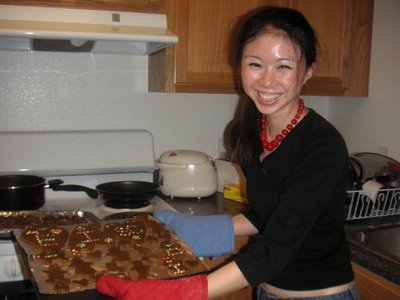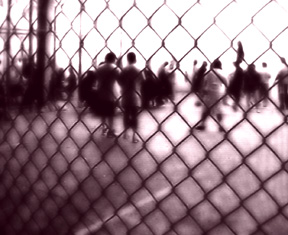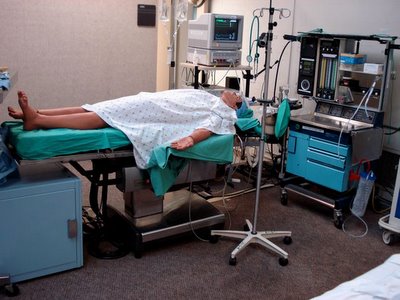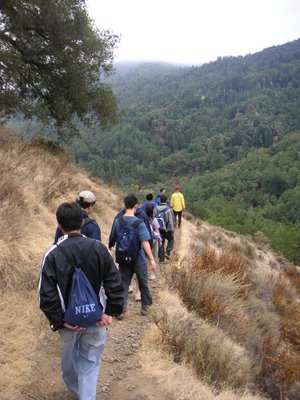Feeling extremely under the weather...this virus has been all six degrees of nasty.
I was supposed to fly home to Los Angeles today, but I had to change my flight to Los Angeles to Sunday. This was a mercy for both me and the passengers on the flight from Boston, because I would end up coughing and throwing up on all of them.
Thursday, December 21, 2006
Tuesday, December 19, 2006
Ten Tables
I got really sick...sore throat, fever, vomiting...the whole shebang. Tonight, my boyfriend took me to a restaurant in Jamaica Plain called Ten Tables (which has exactly ten tables) to try a four-course meal with wine pairings. The theme was Greek cuisine and it was delicious, but I barely made it through the whole meal. >_< Last Saturday, we ate at Tremont 647 and tomorrow night we had reservations at Craigie Street Bistrot (a restaurant that ignited my love of foie gras), but we had to cancel. Even worse, I had to cancel my plans to meet up with my mentee of five years, a college freshman with sickle cell anemia, because I feel as sick as a cat...or possibly a horse.
Monday, December 18, 2006
"The Female Brain"
During my clinical interlude in psychiatry, I had the honor of meeting Dr. Louann Brizendine, a faculty member at UCSF and author of the best-selling book "The Female Brain," which was released in August 2006. Dr. Brizendine is extremely approachable and intelligent, and it is impressive how she took a genuine interest in the activities of the third-year medical students on their psychiatry rotation. It is a privilege to learn medicine at UCSF and rub elbows with a star-studded yet down-to-earth faculty.
Dr. Brizendine's novel has ignited a fair amount of reviews and controversy. Do men and women have brains that are fundamentally different? Dr. Brizendine believes so. However, the entire gender controversy, and especially the excerpt pasted below, eerily reminds me of an anecdote told by a former president of Harvard (named Larry Summers) concerning his daughters who preferred to designate the toy trucks given to them as "daddy truck" and "baby truck" (1)
"Common sense tells us that boys and girls behave differently. We see it every day at home, on the playground, and in classrooms. But what the culture hasn't told us is that the brain dictates these divergent behaviors...One of my patients gave her three-and-a-half-year-old daughter many unisex toys, including a bright red fire truck instead of a doll. She walked into her daughter's room one afternoon to find her cuddling the truck in a baby blanket, rocking it back and forth saying, 'Don't worry, little truckie, everything will be all right.'"
Do men have more spatial intelligence and an affinity for math and science? Are women more interested in communication and writing? Dr. Brizendine may be right...maybe the brains of males and females are completely different...but we are walking a very dangerous line between biological determinism and biological fact. Over one hundred years ago, the "science" of phrenology supposedly "proved" that African-American slaves were inferior and less intelligent than Caucasians by measuring and observing the shapes of many heads (2).
My main concern is that the public imagination will seize upon the biological differences in male and female brains to justify subtle and overt discrimination.
For example, if a woman is supposedly more talkative, emotional, and empathetic -- would the public be more inclined to elect her as Commander-in-Chief?
Earlier this year, Dr. Ben Barres, a transgendered professor at Stanford University School of Medicine wrote a cogent summary of this concern in Nature: "I am suspicious when those who are at an advantage proclaim that a disadvantaged group of people is innately less able. Historically, claims that disadvantaged groups are innately inferior have been based on junk science and intolerance" (3).
Part of our curriculum at UCSF includes a class debate and required essay on the topic of "race-based drugs." Bidil, a drug for the heart, was found to significantly reduce mortality in African-Americans and was approved by the FDA for "self-identified black patients." Our class focused on the issue of designing and manufacturing drugs for specific races...might this be this racism sanctioned by science or an enlightened tailoring of drugs to our unique genetics?
The strongest argument for the promotion of race-based drugs and the idea that men and women have fundamentally different brain structures is that our knowledge of these differences will result in more effective therapies, targeted treatments, and "enlightened thinking." For instance, children were considered to be "miniature adults" in the 18th century, but the modern era considers children to be humans at a special and particularly vulnerable developmental stage. Women are not children, however, so are we opening a Pandora's Box of inequality and half-baked stereotypes? If there truly is a significant biological difference between the brains of men and women, then it is our responsibility to research, investigate, explain and support our findings in a responsible manner.
FOOTNOTES
My footnotes in Blogger will be extremely barbaric, please see the links:
(1) Baby Truck
"Remarks at NBER Conference on Diversifying the Science & Engineering Workforce, Lawrence H. Summers. Cambridge, Mass. January 14, 2005." http://www.president.harvard.edu/speeches/2005/nber.html
(2) Phrenology and Racism
http://pages.britishlibrary.net/phrenology/system/national_character.htm
(3) Ben Barres, MD, PhD
http://ai.eecs.umich.edu/people/conway/TSsuccesses/FtM/BenBarres.html
http://www.ncbi.nlm.nih.gov/entrez/query.fcgi?CMD=search&DB=pubmed
For more information on Dr. Louann Brizendine:
http://louannbrizendine.com/
Raphael Campo
Can a doctor be a poet?
Raphael Campo, MD, is a physician at Beth Israel in Boston, MA. He has published several volumes of poetry, but it must be hard to balance the right and left brain.
"Will you remember me the way I am
today? This long engagement---twenty years---
has taken something of a toll. I came
to bed last night, and thought that we were far
from being done with dreams."
From "On the Right to Marry," May 16, 2004.
http://www.rafaelcampo.com/rc_poem/rc_poem_index.html
Raphael Campo, MD, is a physician at Beth Israel in Boston, MA. He has published several volumes of poetry, but it must be hard to balance the right and left brain.
"Will you remember me the way I am
today? This long engagement---twenty years---
has taken something of a toll. I came
to bed last night, and thought that we were far
from being done with dreams."
From "On the Right to Marry," May 16, 2004.
http://www.rafaelcampo.com/rc_poem/rc_poem_index.html
Sunday, December 17, 2006
e.e. cummings (no pun intended)
Since I can't bear to leave you without being on a more chipper note, here is another poem by e.e. cummings (also check out his poem "Cambridge Ladies," the best part being the last line about a moon rattling around like an angry piece of hard candy). Your eyes are big Love Crumbs.
may i feel said he may i feel said he
(i'll squeal said she
just once said he)
it's fun said she
(may i touch said he
how much said she
a lot said he)
why not said she
how much said she
a lot said he)
why not said she
(let's go said he
not too far said she
what's too far said he
where you are said she)
not too far said she
what's too far said he
where you are said she)
may i stay said he
(which way said she
like this said he
if you kiss said she
(which way said she
like this said he
if you kiss said she
may i move said he
is it love said she)
if you're willing said he
(but you're killing said she
is it love said she)
if you're willing said he
(but you're killing said she
but it's life said he
but your wife said she
now said he)
ow said she
but your wife said she
now said he)
ow said she
(tiptop said he
don't stop said she
oh no said he)
go slow said she
don't stop said she
oh no said he)
go slow said she
(cccome?said he
ummm said she)
you're divine! said he
(you are Mine said she)
ummm said she)
you're divine! said he
(you are Mine said she)
Clever, obscene, short, irreverent...what more can you ask for?
"Two Views of a Cadaver Room"
Picture from: http://www.ibiblio.org/wm/paint/auth/bruegel/death.jpg
Reading poetry is like "emotional eating" for me. When I am stressed, unhappy, or frustrated...I compulsively "self-medicate" myself with poetry.
This particular poem by Sylvia Plath currently escapes my full understanding. The poem is divided into two parts, and the second part is even more disorienting because it suddenly addresses an old Flemish painting by Bruegel. The connection between death and romantic passion can be seen holding the two parts together, but the final meaning still eludes me.
Two Views Of A Cadaver Room by Sylvia Plath
(1)
The day she visited the dissecting room
They had four men laid out, black as burnt turkey,
Already half unstrung. A vinegary fume
Of the death vats clung to them;
The white-smocked boys started working.
The head of his cadaver had caved in,
And she could scarcely make out anything
In that rubble of skull plates and old leather.
A sallow piece of string held it together.
In their jars the snail-nosed babies moon and glow.
He hands her the cut-out heart like a cracked heirloom.
(2)
In Brueghel's panorama of smoke and slaughter
Two people only are blind to the carrion army:
He, afloat in the sea of her blue satin
Skirts, sings in the direction
Of her bare shoulder, while she bends,
Finger a leaflet of music, over him,
Both of them deaf to the fiddle in the hands
Of the death's-head shadowing their song.
These Flemish lovers flourish; not for long.
Yet desolation, stalled in paint, spares the little country
Foolish, delicate, in the lower right hand corner.
Saturday, December 16, 2006
Winter in Boston
Just flew into Boston this morning from Oakland, CA, to visit my boyfriend for a week before going home to LA for Christmas and New Year's. It's 60 degrees Fahrenheit in Boston! Shockingly, there's no SNOW! The picture above is a distant memory of chillier times and only highlights "an inconvenient truth." Someday, when I am a toothless hag, I will tell my grandchildren that Boston used to be an iceland and that Florida was not a body of water. Have a happy holiday season!
Friday, December 15, 2006
Precarious
San Francisco is an amazing town, but the thick fog and ridiculous hills have remained my pet peeves. Today, both elements were in full force...I think that the hills are getting steeper...and usually you can see the Golden Gate Bridge from UCSF, but looking outside today was like gazing into a white void.
Yesterday during a lecture given by a physician struggling with an illness, I realized that doctors usually operate under the precarious assumption that the line of health drawn between patients and doctors is an impermeable barrier. In reality, doctors get sick, fall ill, and also pass away. The assumption that we will always be well and able to care for others is an illusion, but a necessary mental shortcut that we take to focus on the illnesses at hand.
Thursday, December 14, 2006
Living to Die -- Dying to Live
After observing an electroconvulsive therapy (ECT or "electroshock") session in the morning, I followed a third-year medical student and an attending psychiatrist to the bed of an unusual patient. The man was a prisoner serving three consecutive life sentences at San Quentin -- he was also a compulsive swallower who ingested razor blades, metal wires, and sharp objects.
Today, he was in the hospital for swallowing a box cutter blade, but the surgeons were having a hard time preparing for the operation because they had already operated on the prisoner seven previous times for similar reasons. Psychiatry is more difficult than I imagined, because it is hard to discern with certainty what makes one person mentally troubled and another person functionally normal after speaking to him for an hour. At one point during the psychiatrist's interview, the patient-prisoner remarked:
"I'm livin' to die and dyin' to live."
For a man who swallowed a large blade currently sitting in his stomach and who is waiting for a surgery that will save his life...the comment was strikingly paradoxical and fitting. Maybe he was suicidal and depressed, but he was also hopeful and unwilling to die.
He was living to die, like so many other incarcerated prisoners.
But he was also dying to live, like so many other human beings.
Tuesday, December 12, 2006
The Psychiatry of Gingerbread

Gee, Stephanie is posting again...
That means one or more events listed below occurred:
1) She has time (this is one is the Big Bang of reasons)
2) She had an interesting thought (preferably medically related)
3) She had an interesting experience (preferably out-of-body)
4) She was bored (the ugly truth)
5) AN EXAM IS OVER (the real reason for this post)
After resisting for months, I finally began studying at the library to prevent the discomfiture rendered by the last cardiovascular exam (see first post). The suffering was not without certain bright spots of hope -- a friend baked pumpkin pie and it was so nice running out of the library and into the home of a person with fresh-baked pie and whipped cream. :)
Our cardiovascular exam was this past Monday, and it is to UCSF's credit that we get the results back by around 5 p.m. the same day. For those of you who are curious, 70% is the cut-off for passing. UCSF medical school is pass-fail during the first two years, and honors-pass-fail during the third and fourth years. This is how the popular equation "P=MD" arises.
The afternoon after our test was spent with some dear friends from medical school. We embarked on a giant gingerbread cookie project. In an attempt to make as many gingerbread cookies from scratch as possible, we baked for hours and rolled mountains of dough. Several hours later, we had produced about 8 batches of cookies and we were wiped out (see picture above). At first, we thought that it was all fun and games and delighted in mixing and dusting the french rolling pin with flour and using the crowd-pleasing cookie cutters. By the end of the evening, we were like disgruntled elves working in the Keebler tree and we were sick of gingerbread. :)
Having finished our cardiovascular block, we have three days of "mini-rotations" at different wards affiliated with UCSF before cutting loose for Christmas break. Some students have rotations at the trauma wards of Emergency Rooms or shifts in OB-GYN, but most students have assignments to shadow medical teams doing internal medicine, surgery, neurology, pediatrics. What was my assignment? Psychiatry. Although psychiatry is not an interest of mine, I was willing to give the experience a chance.
This is what people call a cliff-hanger.
Monday, December 04, 2006
Patient Stimulator
The Patient Simulator
Today we had a fake patient, or what the medical school prefers to call a "patient simulator." Some UCSF medical students preferto call it a "patient stimulator," because it rolls off the tongue more easily. But it's hard to decide whether we medical students are stimulating the patient, or whether the "patient" is stimulating us. It's probably a reciprocal relationship, like all healthy patient-doctor interactions.
The patient stimulator was an expensive mannequin with real pulse points, breathing action, blinking, and the ability to answer our questions. Pretty neat, if you don't think too hard about the absurdity of the situation. Imagine: seven or so very confused and medically incompetent students dressed in white coats huddled over a mechanical doll. The doll had a little microphone and someone (perhaps the Wizard of Oz hiding behind the breathing machine or blue plastic curtain) would respond to our medical questions and complain about "light-headedness."
Overall, the patient stimulator was a valuable experience, but I feel that we were not properly "primed" about what to expect or how to do certain things. For example, when we decided that the patient needed an echocardiogram (an ultrasound for the heart), the fourth year medical student supervising us said, "Great...how do you get an echocardiogram."
We looked at him blankly and said, "You call someone?"
Platelet Aggression
Now that medical school has been re-capped and we're up to speed, it's time to settle into the more conventional bite-sized entries more typical of blogs.
We're still knee-deep in the cardiovascular block and it's been interesting learning about the anatomy, pharmacology, pathophysiology, histology, and the social and behavioral issues concerning cardiovascular health and disease in an integrated curriculum.
We're still knee-deep in the cardiovascular block and it's been interesting learning about the anatomy, pharmacology, pathophysiology, histology, and the social and behavioral issues concerning cardiovascular health and disease in an integrated curriculum.
Sunday, December 03, 2006
Synopsis of September, October, November
September 2-3: First day of camping in Huddart Park (45 minutes south of San Francisco) with the UCSF medical school class of 2010. Met dozens of new people, played games, frolicked in the pine trees, drank beer, slept in sleeping bags, went home and showered.
September 5-8: UCSF Orientation, the obligatory "welcome wagon" was rolled out and there was free food galore at every event.
September 8: UCSF White Coat Ceremony celebrating our induction into the sacred doctorhood of medicine, and students feel like total frauds because they don't know anything about medicine yet. On one hand, it was a very moving event because it allows students and families to celebrate a life transition and reminds students about the sacred responsibilities of a doctor and why we wanted to be physicians in the first place. On the other hand, it seems a bit premature to celebrate. We literally brought our own white coats to the ceremony so that our advisors could ceremoniously help us dress ourselves onstage in front of hundreds of families. Such healthy skepticism of the white coat ceremony led my parents to decide to stay in Los Angeles to take care of my brothers...my mother told me half-jokingly, "Call us when you graduate." Ouch, I love my mother. It's tough love.
September in general: Went clubbing at Paradise Lounge, played tennis in Golden Gate Park, shopped in the commercial extravaganza known as Union Square in downtown San Francisco, attended an informal wine and cheese party thrown by a fellow first-year medical student (it was packed!), threw and attended a few informal dinner parties held by first-year medical students involving delicious food, flew to Los Angeles to attend a California Medical Association (CMA) leadership conference at UCLA, stared at dinosaur bones during an evening exhibition at the California Academy of Sciences, went clubbing at the Cellar (sponsored by a pharmacy fraternity), studied for our introductory course entitled "Prologue," which includes a lot of science review and human anatomy.
October in general: Took the Prologue midterm, lost my initiative to study, shadowed a pediatric orthopedic surgeon in clinic and in the OR, saw a live surgery and the human spine in situ, went clubbing at Club 181 (organized by a member of our class), sampled many restaurants on Irving Street near UCSF, attended a Food Appreciation Club (FAC) event -- FAC was invented by members of our first-year class to celebrate food, entirely on our own initiative! The FAC's first event was Persian food. In October, the even was "Southern Cookin'" with all of the artery-clogging foods you love to hate, topped off with a performance by a member of our first-year class who is a professional fiddle player. It was awesome.
Also in October: Found the best tapioca milk tea (boba) in Inner Sunset, a tiny unmarked Chinese store called "Wonderful Foods, Co." Learned how to draw blood by volunteering for the Hepatitis B elective at UCSF, watched "Grey's Anatomy" each Thursday at the home of a fellow med student, participated in a "Drunken Grey's Anatomy Night" at said home, attended a QB3 cancer imaging conference at Mission Bay, went hiking in Marin around Mt. Tam with members of my advisory college and our awesome advisors, took the Prologue final, celebrated Halloween on the 27th, 28th, 29th, and 31st. Visited the Castro on Halloween to see the famed flamboyant costumes and left around 10:30 p.m., just before 10 people were fatally shot. Decided not to spend Halloween in the Castro for the rest of my medical school career.
November in general: Volunteered at a Hepatitis B screening event in Japantown, flew to Philadelphia to present a poster at the American Society for Therapeutic Radiology and Oncology (ASTRO) for research on pancreatic cancer done the previous year as a clinical research assistant at Stanford, swooned at a James Blunt concert in San Jose with my college roommate, ate at a delicious pho restaurant with my anatomy group, met up with my little brother at Pier 39 in San Francisco during his trip to northern California for several marching band competitions, interviewed a memorable patient during our Foundations of Patient Care class who was a young woman with a double lung transplant, visited Haight Street and looked at the hippie stores, politely refused numerous offers of marijuana, ate at a tapas restaurant following the first Organs block exam (after Prologue comes Organs: Cardiovascular), walked around Golden Gate Park, celebrated Thanksgiving in Mountain View (home of Google) with my boyfriend and his extended family, sampled Tofurkey for the first time and found the consistency to be quite meat-like.
December thus far: Attended another impromptu turkey dinner held by our first-year class last Friday (in case you didn't notice, I love how our class takes the initiative to throw informal events promoting goodwill and food), shopped in Union Square yesterday and enjoyed eating at La Mediterranean with friends, participated in an informal poker tournament held by fellow classmates but cashed out early. That was last night.
BOTTOM LINE: UCSF students are extremely social and outgoing. The first few months of medical school have been amazing. There is no shortage of events, free food, or activities offered by the school, by the class, or by the city itself.
~~~~~~~~~~~~~~~~~~~~~~~~~~~~~~~~~~~~~~~~~~~~~~~~~~~
Not all students at other UCSF schools resemble the self-acknowledged slackers in medical school, however. My roommate, E, is a first-year pharmacy student and we have discussed on numerous occasions how the pharmacy school appears to work its students "like the rent is due tomorrow."
The pharmacy students are awesome, by the way, and they DO party very hard. They had finals this past week on four consecutive days, but now they get the whole month of December as a vacation. The wayward medical students, however, only get 2 weeks off and must return on January 2nd for class.
Subscribe to:
Comments (Atom)









